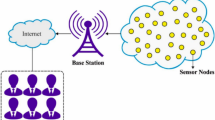Abstract
In this paper, we present a new method for tracking moving target in a wireless sensor network based on the combination of Non-dominated Sorting Genetic Algorithm II (NSGA-II) and Generalized Extended Kalman Filter (GEKF) (NGEKF). GEKF is one of the best positioning algorithm but using all sensors in target tracking and high energy consumption are its drawbacks. To overcome these drawbacks, the sensor scheduling problem is considered as finding the optimal sequence of the sensors to estimate the target position. Since, we have used NSGA-II as the best approach to select a proper sensor group. In this method, tracking of a moving node with eight reference sensors is simulated using a multiplicative measurement noise model in two different noise conditions (low noise and high noise). Simulation results have demonstrated that not only energy consumption is reduced but also the positioning precision is improved.











Similar content being viewed by others
References
Cao N, Choi S, Masazade E, Varshney PK (2016) Sensor Selection for target tracking in wireless sensor networks with uncertainty. IEEE Trans Signal Process 64(20):5191–5204. https://doi.org/10.1109/TSP.2016.2595500
Dokoupil J, Voda A, Václavek P (2017) Regularized extended estimation with stabilized exponential forgetting. IEEE Trans Autom Control 62(12):6513–6520. https://doi.org/10.1109/TAC.2017.2656379
Estrin D, Girod L, Pottie G, Srivastava M (2001) Instrumenting the world with wireless sensor networks. In: 2001 IEEE international conference on acoustics, speech, and signal processing, Proceedings (Cat. No.01CH37221), vol 4, pp 2033–2036 vol.4, https://doi.org/10.1109/ICASSP.2001.940390
Evensen G (2009) Data assimilation: the ensemble Kalman Filter. Springer, New York
He T, Krishnamurthy S, Luo L, Yan T, Gu L, Stoleru R, Zhou G, Cao Q, Vicaire P, Stankovic JA, Abdelzaher T, Hui J, Krogh B (2006) VigilNet: an integrated sensor network system for energy-efficient surveillance. ACM Trans Sensor Netw 2(1):1–38. https://doi.org/10.1145/1138127.1138128. https://experts.illinois.edu/en/publications/vigilnet-an-integrated-sensor-network-system-for-energy-efficient
Hoffmann GM, Tomlin CJ (2010) Mobile Sensor network control using mutual information methods and particle filters. IEEE Trans Autom Control 55(1):32–47. https://doi.org/10.1109/TAC.2009.2034206
Hu X, Hu YH, Xu B (2013) Generalised Kalman filter tracking with multiplicative measurement noise in a wireless sensor network. IET Signal Proc 8(5):467–474. https://doi.org/10.1049/iet-spr.2013.0161
Hu X, Bao M, Zhang X, Guan L, Hu Y (2015) Generalized iterated Kalman Filter and its performance evaluation. IEEE Trans Signal Process 63(12):3204–3217. https://doi.org/10.1109/TSP.2015.2423266
Joshi S, Boyd S (2009) Sensor selection via convex optimization. IEEE Trans Signal Process 57(2):451–462. https://doi.org/10.1109/TSP.2008.2007095
Liu F, Jiang C, Chen S, Xiao W (2018) Multi-sensor scheduling for target tracking based on constrained ADP in energy harvesting WSN. In: 2018 13th IEEE conference on industrial electronics and applications (ICIEA), pp 1579–1584. https://doi.org/10.1109/ICIEA.2018.8397961
Liu S, Kar S, Fardad M, Varshney PK (2015) Sparsity-aware sensor collaboration for linear coherent estimation. IEEE Trans Signal Process 63(10):2582–2596. https://doi.org/10.1109/TSP.2015.2413381
Liu W (2016) Optimal filtering for discrete-time linear systems with time-correlated multiplicative measurement noises. IEEE Trans Autom Control 61(7):1972–1978. https://doi.org/10.1109/TAC.2015.2480238
Luo J, Han Y, He X (2019) Optimal bit allocation for maneuvering target tracking in UWSNs with additive and multiplicative noise. Signal Process 164:125–135. https://doi.org/10.1016/j.sigpro.2019.06.005. http://www.sciencedirect.com/science/article/pii/S0165168419302130
Ma Q, Xu D, lv P, Shi Y (2007) Application of NSGA-II in parameter optimization of extended state observer. In: Cen K, Chi Y, Wang F (eds) Challenges of power engineering and environment. Springer, Berlin, pp 587–592
Masazade E, Niu R, Varshney PK, Keskinoz M (2010) Energy aware iterative source localization for wireless sensor networks. IEEE Trans Signal Process 58(9):4824–4835. https://doi.org/10.1109/TSP.2010.2051433
Musa A, Gonzalez V, Barragan D (2019) A new strategy to optimize the sensors placement in wireless sensor networks. J Ambient Intell Hum Comput 10(4):1389–1399. https://doi.org/10.1007/s12652-018-0868-2
Olfati-Saber R (2007) Distributed Kalman filtering for sensor networks. In: 2007 46th IEEE Conference on Decision and Control, pp 5492–5498. https://doi.org/10.1109/CDC.2007.4434303
Qian H, Fu P, Li B, Liu J, Yuan X (2018) A novel loss recovery and tracking scheme for maneuvering target in hybrid WSNs. Sensors 18(2):341. https://doi.org/10.3390/s18020341. https://www.mdpi.com/1424-8220/18/2/341
Rai Bellipady S, Shetty SM, Airbail H (2019) Quality of information analysis in WSN: an application in BASN. J Ambient Intell Hum Comput. https://doi.org/10.1007/s12652-019-01362-7
Rao B, Durrant-Whyte H, Sheen J (1993) A fully decentralized multi-sensor system for tracking and surveillance. Int J Robot Res 12(1):20–44. https://doi.org/10.1177/027836499301200102
Ribeiro A, Giannakis GB, Roumeliotis SI (2006) SOI-KF: distributed Kalman filtering with low-cost communications using the sign of innovations. IEEE Trans Signal Process 54(12):4782–4795. https://doi.org/10.1109/TSP.2006.882059
Seada H, Deb K (2018) Non-dominated sorting based multi/many-objective optimization: two decades of research and application. In: Mandal JK, Mukhopadhyay S, Dutta P (eds) Multi-objective optimization: evolutionary to hybrid framework, Springer, Singapore, pp 1–24. https://doi.org/10.1007/978-981-13-1471-1-1
Shahzad F, Sheltami TR, Shakshuki EM (2016) Effect of network topology on localization algorithm’s performance. J Ambient Intell Hum Comput 7(3):445–454. https://doi.org/10.1007/s12652-016-0349-4
Shareef A, Zhu Y (2009) Localization using extended Kalman filters in wireless sensor networks. Kalman Filter Recent Advances and Applications. https://doi.org/10.5772/6811. https://www.intechopen.com/books/kalman-filter-recent-adavnces-and-applications/localization-using-extended-kalman-filters-in-wireless-sensor-networks
Sheltami TR, Khan S, Shakshuki EM, Menshawi MK (2016) Continuous objects detection and tracking in wireless sensor networks. J Ambient Intell Hum Comput 7(4):489–508. https://doi.org/10.1007/s12652-016-0380-5
Tatari F, Akbarzadeh TM, Mazouchi M, Javid G (2009) Agent-based centralized fuzzy Kalman filtering for uncertain stochastic estimation. In: 2009 Fifth International conference on soft computing, computing with words and perceptions in system analysis, decision and control, pp 1–4. https://doi.org/10.1109/ICSCCW.2009.5379483
Vasuhi S, Vaidehi V (2016) Target tracking using interactive multiple model for wireless sensor network. Inf Fusion 27:41–53. https://doi.org/10.1016/j.inffus.2015.05.004. http://www.sciencedirect.com/science/article/pii/S1566253515000482
Verma N, Singh D (2018) Data redundancy implications in wireless sensor networks. Proc Comput Sci 132:1210–1217. https://doi.org/10.1016/j.procs.2018.05.036. http://www.sciencedirect.com/science/article/pii/S1877050918307683
Wang X, Fu M, Zhang H (2012) Target tracking in wireless sensor networks based on the combination of KF and MLE using distance measurements. IEEE Trans Mob Comput 11(4):567–576. https://doi.org/10.1109/TMC.2011.59
Wang Z, Ye N, Malekian R, Xiao F, Wang R (2016) TrackT: accurate tracking of RFID tags with mm-level accuracy using first-order Taylor series approximation. Ad Hoc Netw 53:132–144. https://doi.org/10.1016/j.adhoc.2016.09.026. http://www.sciencedirect.com/science/article/pii/S1570870516302736
Wen S, Xing L, Hu X, Zhang H (2017) Measurement-converted Kalman filter tracking with Gaussian intensity attenuation signal in wireless sensor networks. Int J Distrib Sens Netw 13(4):1550147717700896. https://doi.org/10.1177/1550147717700896
Williams JL, Fisher JW, Willsky AS (2007) Approximate dynamic programming for communication-constrained sensor network management. IEEE Trans Signal Process 55(8):4300–4311. https://doi.org/10.1109/TSP.2007.896099
Woeginger GJ (2003) Exact Algorithms for NP-hard problems: a survey. In: Jünger M, Reinelt G, Rinaldi G (eds) Combinatorial Optimization – Eureka, You Shrink!: Papers Dedicated to Jack Edmonds 5th International Workshop Aussois, France, March 5–9, 2001 Revised Papers, Lecture Notes in Computer Science, Springer, Berlin, pp 185–207. https://doi.org/10.1007/3-540-36478-1-17
Yan L, Lu Y, Zhang Y (2017) An improved NLOS identification and mitigation approach for target tracking in wireless sensor networks. IEEE Access 5:2798–2807. https://doi.org/10.1109/ACCESS.2017.2677480
Yang X, Zhang W, Chen MZQ, Yu L (2017) Hybrid sequential fusion estimation for asynchronous sensor network-based target tracking. IEEE Trans Control Syst Technol 25(2):669–676. https://doi.org/10.1109/TCST.2016.2558632
Yang Y, Li L, Li H (2013) Data forwarding of realtime mobile target tracking in wireless sensor networks. J Ambient Intell Hum Comput 4(1):109–120. https://doi.org/10.1007/s12652-012-0106-2
Zhang H, Ayoub R, Sundaram S (2017) Sensor selection for Kalman filtering of linear dynamical systems: complexity, limitations and greedy algorithms. Automatica 78:202–210. https://doi.org/10.1016/j.automatica.2016.12.025. http://www.sciencedirect.com/science/article/pii/S0005109816305337
Zhang H, Zhou X, Wang Z, Yan H, Sun J (2019) Adaptive consensus-based distributed target tracking with dynamic cluster in sensor networks. IEEE Trans Cybern 49(5):1580–1591. https://doi.org/10.1109/TCYB.2018.2805717
Zhang S, Tepedelenlioǧlu C, Banavar MK, Spanias A (2016) Max consensus in sensor networks: non-linear bounded transmission and additive noise. IEEE Sens J 16(24):9089–9098. https://doi.org/10.1109/JSEN.2016.2612642
Zuo L, Niu R, Varshney PK (2008) A sensor selection approach for target tracking in sensor networks with quantized measurements. In: 2008 IEEE international conference on acoustics, speech and signal processing, pp 2521–2524. https://doi.org/10.1109/ICASSP.2008.4518161
Author information
Authors and Affiliations
Corresponding author
Additional information
Publisher's Note
Springer Nature remains neutral with regard to jurisdictional claims in published maps and institutional affiliations.
Rights and permissions
About this article
Cite this article
FayaziBarjini, E., Gharavian, D. & Shahgholian, M. Target tracking in wireless sensor networks using NGEKF algorithm. J Ambient Intell Human Comput 11, 3417–3429 (2020). https://doi.org/10.1007/s12652-019-01536-3
Received:
Accepted:
Published:
Issue Date:
DOI: https://doi.org/10.1007/s12652-019-01536-3




